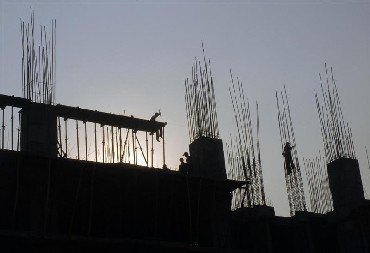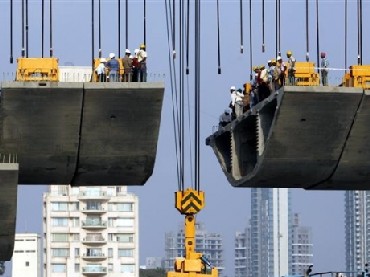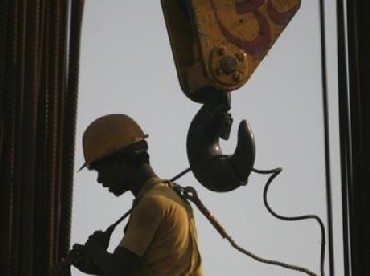Photographs: Reuters Malini Bhupta in Mumbai
Nothing seems to have gone right for the real estate industry in the last couple of years. All the excesses of boom times are coming back to haunt the players.
From rising interest rates to an inventory build-up, the industry has remained under pressure.
The Realty Index is close to its October 2008 lows, suggesting investors are risk averse and are expecting a repeat of 2008-09.
According to some foreign brokerages, reality isn't so bad. While high inflation and interest rates coupled with corporate governance issues may act as a negative overhang for the sector, valuations look attractive now.
...
The 'reality' of realty sector isn't so bad
Photographs: Reuters
Unlike the past, when valuations were mostly based on land bank sizes alone, now analysts look at numerous parameters to arrive at valuations.
For instance, Standard Chartered Equity Research has adopted a VALLCRAB matrix to assess companies in this universe.
This matrix examines visibility on projects, asset turnover, leverage, land bank quality, cash flows, return on equity, annuity stream and breakeven analysis.
The biggest overhang for most realty stocks has been the high debt on their books. With real estate prices touching new highs, after the peak of 2006-07, buyers have deferred purchase decisions, causing a build-up of inventory.
...
The 'reality' of realty sector isn't so bad
Photographs: Reuters
The debt burden of eight companies - DLF, Unitech, Indiabulls Real Estate, HDIL, Oberoi, Sobha and Prestige - is close to $3 billion, which has to be repaid between FY12 and FY13.
Analysts believe free cash-flows of these companies are not enough to repay and, thus, most of this debt will have to be refinanced or converted into new debt for new projects.
According to Standard Chartered analysts, DLF and Unitech look most under pressure as the cost of debt will inch up. Players may face some stress in the first quarter of FY12 as repayments come up in this period.
Amongst listed players, during FY12 DLF, Unitech and Sobha need to repay Rs 2,600 crore (Rs 26 billion), Rs 1,000 crore (Rs 10 billion) and Rs 550 crore (Rs 5.5 billion), respectively, says Religare.
Of this, Unitech and Sobha need to repay Rs 300 crore (Rs 3 billion) and Rs 200 crore (Rs 2 billion), respectively, in the first quarter of FY12.
...
The 'reality' of realty sector isn't so bad
Photographs: Reuters
But the good news is that despite the debt burden, some companies will have positive free cash flows over FY12-14.
Consequently, analysts estimate the sector's gross debt/equity ratio to halve from 1x in FY09 to 0.5x by FY12E, primarily due to the increase in net worth led by capital infusion.
Undoubtedly, inventory levels have gone up for both commercial and residential real estate; analysts believe these levels are not as bad as they were in 2008-09.
With residential stocks at 11 months of sales (lowest since September 2008), the market is clearly not very heavy on inventory.
...
The 'reality' of realty sector isn't so bad
Photographs: Reuters
Certain micro markets like Hyderabad do suffer from low absorption and high inventory.
Analysts expect pick up in commercial real estate once there is clarity on the direct tax code.
While commercial inventory at 61 months looks high, it is widely believed that much of it is at IT SEZs, currently unoccupied due to uncertainty over DTC.
Strong momentum in the IT sector would translate into accelerated demand for commercial space especially in the IT hubs of Bangalore and Chennai.







article